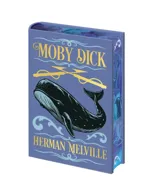Moby-Dick
(Author) Herman MelvilleMelville's Moby Dick sets the tone for American epic literature. Modern classics have tried countless times to rival the feats in which Herman with Moby-Dick underscores, none coming close to the grip this never-ending-adventure-of-a-novel has on its readers, accounting for and ascending the anatomy of whales, to American-Indigenous culture, to classical scripture.
Herman Melville
Herman Melville (1819-1891) was an American novelist, poet, and short story writer best known for his novel "Moby-Dick," a complex and symbolic work that explores themes of obsession, fate, and the struggle between good and evil. Melville's writing style is characterized by its rich symbolism, philosophical depth, and exploration of existential themes. His other notable works include "Typee," "Billy Budd," and "Bartleby, the Scrivener." Melville's contributions to literature have had a lasting impact on the development of American literature, particularly in the genre of the novel.






